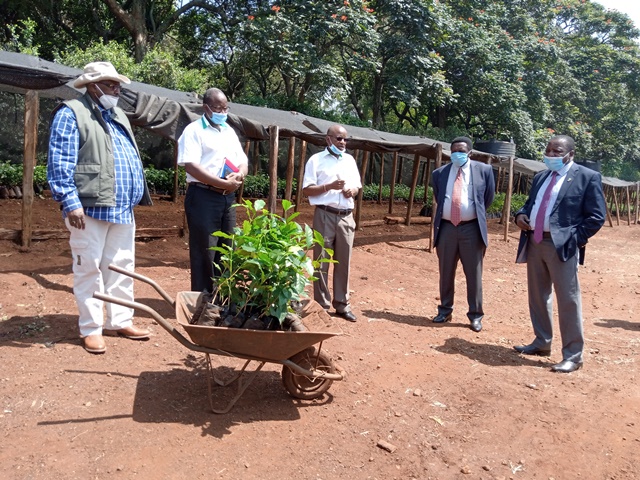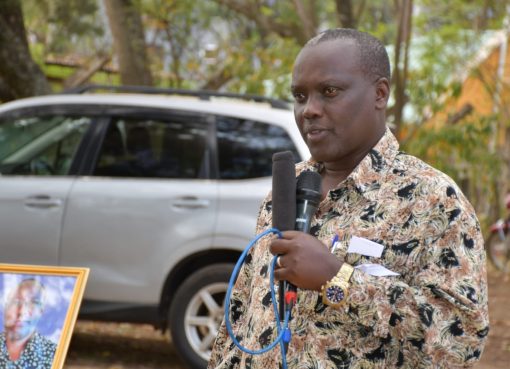Kenya will soon reclaim her share in the international coffee market in future, thanks to an ambitious programme by government to provide adequate planting materials to farmers in order to boost production.
In the current planting season the ministry of agriculture under a programme component of the Big4 Four Agenda is expected to distribute 140,000 seedlings to small-holders farmers across the coffee growing counties.
Kenya Agricultural Livestock and Research Organization (KALRO) Director general Eliud Kireger said provision of adequate planting materials is set to tame the decreasing production and thus enhance the country’s profile internationally.
“The developed seedlings are set to help farmers expand their farms as well as replacing old varieties that are vulnerable to the vagaries of the climate change,” said Dr. Kireger.
Handing over the 140,000 seedlings to Paul Musyoka who represented the principal secretary ministry of agriculture Hamadi Boga at CRI headquarters Ruiru Friday , Kireger explained that development of the new varieties has over the years contributed to expansion of area under coffee as farmers in non-traditional regions like Western and Rift valley regions embracing the crop.
“This has been made possible through CRI partnership with value chain players, for example, Coffee Subsector Implementation Committee (CSIC),” Kireger added.
CSIC chairman Joseph Kieyah explained that the financing of the Ksh5.6 million project was part of the recommendations highlighted by the National Coffee Task Force Report 2016. Kenya peak production reached about 130,000 metric tonnes in 1987/88 production but owing various factors the output has been oscillating between 40,000 and 50,000 metric tonnes.
“Production and access to qualify coffee planting material has remained one of the main challenges that limited coffee expansion and production. Currently, there is increased demand for coffee planting materials for resistance coffee varieties –Ruiru 11 and Batian,” he said.
He added, “This trend in demand is expected to continue into the foreseeable future and CRI may not be in a position to meet the amount of coffee seedlings required by farmers due to limited funding.”
The seedlings production initiative Kieyah said is the committee contribution to the Big 4 Agenda though the state department of crop development and agricultural research will be responsible for distribution of the seedlings.
Kieyah added, the committee has further allocated CRI an additional sum of Sh10 million to produce 250,000 Ruiru 11 and Batian seedlings for distribution to the small scaler farmers in the coming October short rains season.
And further Sh4.3 million to finance soil sampling and testing in here counties, that were not covered. “The results from the soil testing will ensure appropriate soil fertility interventions are undertaken including fertiliser application,” he added.
The seedlings have been raised from the CRI nurseries located at Koru substation in Kericho County 30,000 seedlings, Namwela substation in Bungoma (30,000), Kitale substation in Trans Nzoia (45,000) and 35,000 in Marienne substation in Meru County.
CRI director Elijah Gichuru explained that the country has an annual demand of between six and 10 million seedlings against a production capacity of about one million.
“With assistance of various local and international organizations we have been supplying planting materials to farmers in the country though still not able to meet the demand,” said Dr. Gichuru.
For example, in 2013 the European Union (EU) extended Sh277 million EU grant to Kenya under Coffee Productivity Project (CPP) to finance decentralization of coffee research activities in order to maximize production of planting materials and enhance access to the farmers.
More than 60,000 smallholder farmers benefited with seedlings of new coffee varieties –Batian and Ruiru 11 and coffee farming increased by over 3,500 acres. The two varieties are resistant to the coffee berry and leaf rust diseases and can grow at ecological zones.
Under the project CRI contracted 28 coffee societies in 14 coffee growing counties to produce seedlings and sell to farmers at subsidized prices. “Our estimation is that in the next five years, coffee production will increase substantially and thus boost farmers’ income,” he added.
By Wangari Ndirangu
Government receives 140,000 coffee seedlings




